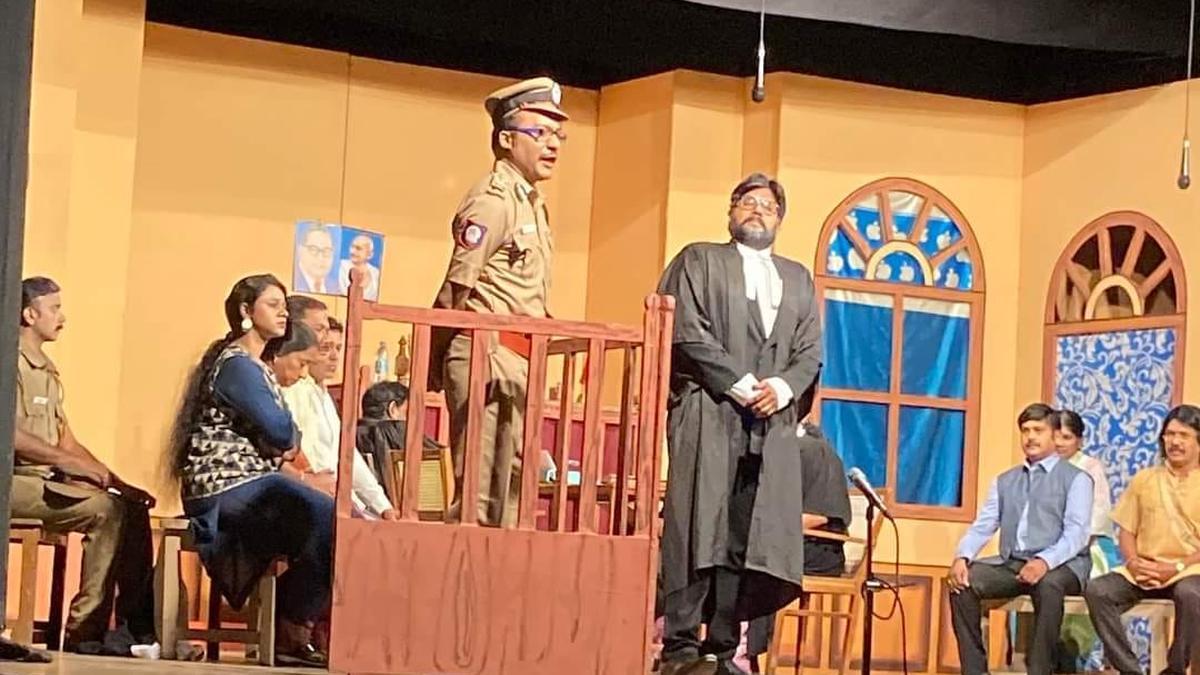
Before Komal Theatres’ play Roudhiram Pazhagu began, Dharini Komal, the mind behind the story and direction, disclosed that the play was grounded in the Nirbhaya rape case—a gruesome incident that shook the entire nation several years ago. However, as the drama unfolded, it became clear that the narrative was not merely inspired by this horrific event but largely constituted a detailed recounting of what had transpired. While slight creative liberties were taken, such as the change of the name Nirbhaya to Deepika, the play retained an unnerving amount of factual detailing that could have been approached more sensitively.
The essence of creating an impactful narrative from a real-life tragedy is a double-edged sword. On the one hand, it thrusts the painful truth into the public eye, ensuring it isn’t forgotten. On the other hand, a mere reproduction of the occurrences, without deeper interpretative layering, may dilute the emotional and social commentary that such stories demand. Despite these pitfalls, Dharini Komal deserves recognition for a handful of creative additions that added a layer of political context and social commentary to the narrative.
In one illuminating scene, the reactions of politicians to the crime were portrayed with a stark realism that echoed the actual state of affairs. The opposition leader saw the tragedy as an opportunity to further their political ambitions, making a spectacle out of the suffering. Meanwhile, the ruling party endeavored to divert public focus away from the incident, seeking to dim its implications on their governance. In a grotesque turn of events, they even planted stories in the media alleging the immorality of Deepika, thereby trying to degrade her character in the public eye.
The media’s role was illustrated with unflinching accuracy, highlighting its tendency to sensationalize such cases. The press added spurious, yet sensationally juicy details to their reports, transforming a grim reality into fodder for heightened viewership. These pieces, often devoid of factual basis, contributed to the narrative, showcasing the unethical side of news reporting.
The play’s title, Roudhiram Pazhagu, is a poignant reference to a line from poet Bharati, which translates to “Learn to be angry.” This righteous anger, as suggested by the poet, is a crucial response in such harrowing circumstances.
. While the intent to channel this anger was evident, the execution left much to be desired. The parents of Deepika, particularly her mother portrayed by Anu Kannan, displayed emotional devastation with compelling realism. However, their sorrow rarely transitioned into outward fury against the perpetrators, as one might expect in such a narrative.
Toward the end of the play, there was a feeble attempt to align the narrative with the title’s call to righteous anger. The audience was urged to be vocal in their protest and indignation. Although this was a step in the right direction, a more robust approach might have included discussions on empowering women through self-defense techniques or advocating for legal reforms to ensure that juvenile offenders face significant consequences for their actions.
The courtroom scenes, led by Lawyer Sangeetha, were presented more as moralistic discourses, focusing on how women’s safety can no longer be taken for granted. These moments, while important, sometimes felt like homilies rather than poignant criticisms of a judicial system often found lacking.
Anu Kannan, taking on the role of Deepika’s mother, delivered a performance marked by its emotional depth. Her journey through grief was palpable, as she portrayed a mother grappling with the unimaginable loss of her child. Yet, this grief rarely transformed into visible anger, missing an avenue to channel the audience’s own potential outrage.
The play’s overall atmosphere leaned towards placidity, a characteristic seemingly incongruent with its subject matter. Grief and devastation were depicted with care, but the driving force of anger, as suggested by Bharati and symbolized in the title, was conspicuously subdued.
Ultimately, Roudhiram Pazhagu highlighted the need for societal action in response to violence against women but missed opportunities to delve deeper into actionable insights. The play shed light on the political and media machinations that accompany such tragedies, providing a valuable, albeit muted, conversation starter. However, more insightful explorations into empowerment and legal recourse could have transformed it from a somber recount into a call for actionable change.












